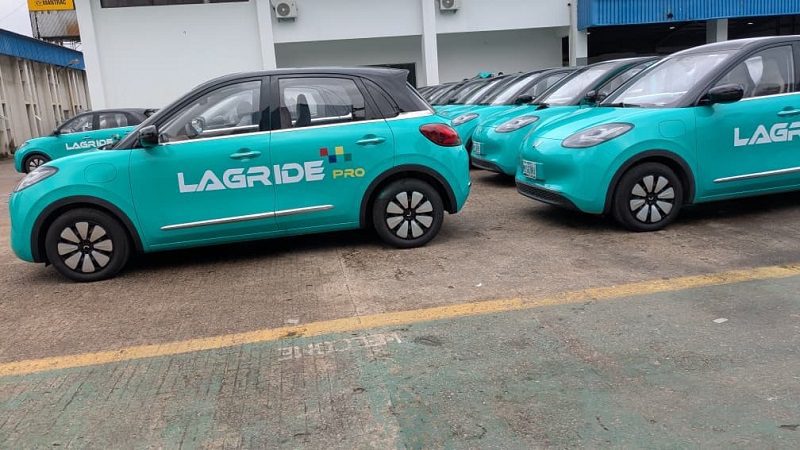LagRide, the Lagos State government-backed e-hailing service operated by CIG Group has unveiled 100 new electric cars, reinforcing the company’s commitment to cleaner, smarter, and more reliable urban mobility.
The new fleet addition comes as part of LagRide’s ongoing strategy to expand its vehicle numbers weekly, ensuring riders can meet growing demand, particularly during the busy end-of-year period.
Adeniyi Saliu, Executive Director of LagRide, emphasised the company’s focus on environmentally friendly and technologically advanced transport solutions.
“The fleet expansion is designed to create thousands of dignified jobs across operations, maintenance and driver pathways, while improving daily life for residents and visitors,” Saliu said.
What You Should Know
Saliu highlighted benefits such as shorter wait times, reduced emissions, and enhanced reliability during peak travel hours, noting that the company’s rigorous maintenance culture ensures vehicles operate at high standards day after day.
The executive director elaborated on the company’s approach to maintenance, which includes scheduled preventive servicing, data-driven diagnostics, quality parts, and trained technicians. Drivers also undergo continuous education on care, safety, and efficiency.
“The difference Lagosians will feel is not only new vehicles but the discipline that keeps them operating at a high standard, day after day,” Saliu added.
According to the company, each new electric car is designed for urban performance, capable of travelling over 333 kilometres on a single charge and reaching operational readiness in as little as 30 minutes under rapid charging conditions.
Multiple charging stations across Lagos support efficient vehicle rotation, ensuring minimal downtime and more earnings for drivers.
Understanding LagRide’s Leasing Programme
In tandem with the fleet expansion, LagRide also announced a new vehicle leasing programme in partnership with Nigerian banks, aimed at placing 10,000 additional drivers on Lagos roads before year-end.
Chief Diana Chen, Chairman of CIG Group, highlighted the programme’s timing and importance, noting that Lagos will become the heartbeat of Africa.
“LagRide exists so that movement around the city is dignified, safe and joyful. By joining forces with Nigerian banks, we are handing the steering wheel of that experience to empowered local entrepreneurs,” Chief Chen said.
According to Chief Chen, the leasing programme allows drivers to access brand-new CIG vehicles through quick bank approvals and competitive rates. It provides a clear pathway to vehicle ownership, enabling drivers to take full possession of their cars in the shortest possible time.
Flexible Support for Drivers
Repayments under the leasing programme are structured weekly, aligned with actual kilometres driven, ensuring affordability and sustainability.
The company added that drivers also benefit from full coverage, including maintenance, insurance, and operational support. This approach allows them to focus on service delivery without the burden of unexpected costs.
Jubril Arogundade, Acting Managing Director of LagRide Nigeria Limited, said the initiative reflects the company’s founding promise to provide world-class, locally tailored solutions.
“From day one, we have offered local solutions that meet world-class standards. The new leasing programme continues that promise by giving drivers a simple, transparent route to owning the cars they drive while improving service quality for riders,” he said.
What This Means
Nigeria’s electric vehicle (EV) market is experiencing significant growth, albeit from a modest base. As of 2025, estimates suggest that between 15,000 and 20,000 EVs are operating on Nigerian roads.
Analysts say this uptick is attributed to a combination of government incentives, such as the National Automotive Industry Development Plan (NAIDP), and increasing consumer interest in sustainable transportation options.
Across Africa, the EV market is poised for substantial expansion. In 2024, African EV sales more than doubled to nearly 11,000 units, reflecting a growing shift towards cleaner mobility solutions.
The market was valued at approximately $15.63 billion in 2023 and is projected to reach $28.30 billion by 2030, driven by policy incentives and increasing infrastructure development.
With the new electric fleet and leasing programme, experts say LagRide aims to improve urban mobility, provide dignified employment, and contribute to a cleaner, quieter, and more sustainable Lagos.
Talking Points
It is impressive that LagRide continues to expand its electric vehicle fleet, adding 100 new cars at a time when Lagos is experiencing rapid urbanisation and growing transport demand.
At Techparley, we see how initiatives like this can accelerate Lagos’ shift toward cleaner transport, reducing emissions and supporting the state’s broader economic and environmental vision.
The integration of vehicle maintenance, driver education, and data-driven fleet management means that riders can now enjoy shorter wait times, smoother trips, and a consistently high-quality transport experience.
As the leasing programme scales, we see an opportunity for strategic partnerships with banks, local government, and vehicle manufacturers to empower more drivers, ensuring financial sustainability and dignified employment.
With the right execution and continuous support, LagRide has the potential to set a new standard for e-hailing services in Lagos, combining environmental sustainability, economic opportunity, and rider convenience.





